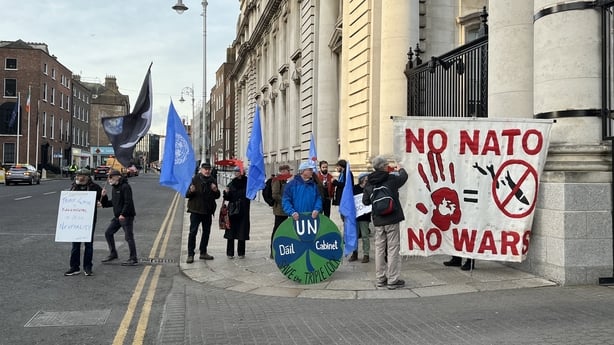Sinn Féin has accused the Government of taking the first dangerous steps towards abandoning the country's long-standing policy of neutrality after draft legislation to amend the Triple Lock was approved by the Cabinet.
Sinn Féin TD Pearse Doherty said the move took place on the day the President of the European Commission announced a major ramping up of military spending.
It was against this backdrop that the Government was unravelling the Triple Lock, he said in the Dáil.
Sinn Féin has called for a referendum on Irish neutrality.
'Exercising our own sovereignty'
Responding, the Taoiseach said the consultative forum on security had found that there was no link between the Triple Lock and Ireland's standing internationally.
Micheál Martin was adamant that Russia and China should not have a veto on where Irish troops are sent.
He vowed that this country would remain militarily neutral but added that Ireland was never politically neutral.
"This is about exercising our own sovereignty," the Taoiseach said.
The draft legislation removes the requirement for United Nations approval when deploying Irish troops outside the State.
Under the bill, the number of soldiers that could be deployed as part of any mission would increase from 12 to 50.
A number of people carrying UN flags took part in a protest outside Government Buildings this morning, to coincide with the Cabinet meeting, calling for the Triple Lock to be maintained.

Watch: What is Ireland's Triple Lock mechanism?
Earlier, Mr Martin said he initiated the legislation when he was Minister for Defence on the basis that "we do not want Russia or other members of the Security Council vetoing decisions that the Irish Government should take with the Oireachtas, in terms of being part of peacekeeping missions into the future".
"I think that's the logical and sensible thing to do given how the Security Council has changed over the years," he added.
Tánaiste and Minister for Foreign Affairs and Defence Simon Harris said there is a lot of "misinformation and disinformation" being spread about the proposal before the draft legislation was published, which he described as "quite astonishing".
He said military neutrality is "extraordinarily important" and is "something I passionately value, something the overwhelming majority of people value".
Speaking on RTÉ's Six One, the Tánaiste claimed that the Government's removal of the Triple Lock was about taking back "sovereignty" of the deployment of Irish troops.
Mr Harris said military neutrality was "extraordinarily important to the Irish people" but we now need to spend more on defence and security.
We need your consent to load this rte-player contentWe use rte-player to manage extra content that can set cookies on your device and collect data about your activity. Please review their details and accept them to load the content.Manage Preferences
"We've a very proud track record in this country of peacekeeping and that's what this is about. Peacekeeping," he said.
He added: "The idea that any permanent member of the [UN] Security Council can have a veto - including Vladimir Putin - on where our Defence Forces go is not democratic.
"People go out in elections and they vote for the democratically elected members of the Dáil and the Government and I do think it’s important that we do provide that opportunity for those decisions to be take here in Ireland."
'Cornerstone of Irish neutrality'
Meanwhile, Aontú leader Peadar Tóibín has claimed that the Government is "using" the crisis in Ukraine to send Irish Defence Forces on EU military missions.
Describing the Triple Lock as the "cornerstone of Irish neutrality", he said if the Government wants to change the Triple Lock then it should "go back to the people in a referendum".
Mr Tóibín contended that this would be appropriate given the assurances provided by the Government when the Nice 2 treaty was passed, that the Triple Lock would guarantee Irish neutrality.
He said neutrality means being non-aligned with military blocks, and while he acknowledged the deadlock in the UN Security Council, he said the State could pursue what he termed "positive active neutrality" by diplomatically pushing for peace across the glove - including in Gaza and Ukraine.
We need your consent to load this rte-player contentWe use rte-player to manage extra content that can set cookies on your device and collect data about your activity. Please review their details and accept them to load the content.Manage Preferences
Labour Party leader Ivana Bacik said her party would oppose any move "to dismantle" the Triple Lock.
It is "even more important" to stand with Ukraine after Donald Trump's recent "appalling" treatment of the Ukrainian president.
She asked what the Taoiseach means when he says that changes "will not compromise Irish neutrality".
Micheál Martin said of the proposed change, that "fundamentally, it will be in the spirit of the UN Charter".
But you do not want Russia being able to veto a peace-keeping mission, he added.
It is "incomprehensible" to allow that to occur.

